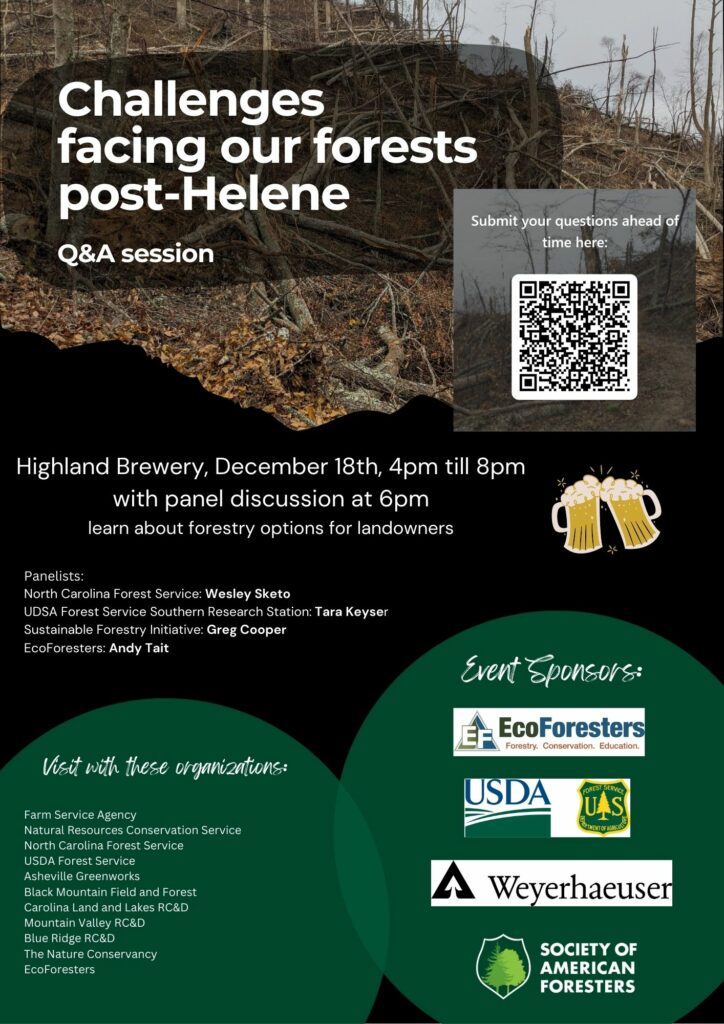Challenges Facing Our Forests Post-Helene
go.ncsu.edu/readext?1041657
en Español / em Português
El inglés es el idioma de control de esta página. En la medida en que haya algún conflicto entre la traducción al inglés y la traducción, el inglés prevalece.
Al hacer clic en el enlace de traducción se activa un servicio de traducción gratuito para convertir la página al español. Al igual que con cualquier traducción por Internet, la conversión no es sensible al contexto y puede que no traduzca el texto en su significado original. NC State Extension no garantiza la exactitud del texto traducido. Por favor, tenga en cuenta que algunas aplicaciones y/o servicios pueden no funcionar como se espera cuando se traducen.
Português
Inglês é o idioma de controle desta página. Na medida que haja algum conflito entre o texto original em Inglês e a tradução, o Inglês prevalece.
Ao clicar no link de tradução, um serviço gratuito de tradução será ativado para converter a página para o Português. Como em qualquer tradução pela internet, a conversão não é sensivel ao contexto e pode não ocorrer a tradução para o significado orginal. O serviço de Extensão da Carolina do Norte (NC State Extension) não garante a exatidão do texto traduzido. Por favor, observe que algumas funções ou serviços podem não funcionar como esperado após a tradução.
English
English is the controlling language of this page. To the extent there is any conflict between the English text and the translation, English controls.
Clicking on the translation link activates a free translation service to convert the page to Spanish. As with any Internet translation, the conversion is not context-sensitive and may not translate the text to its original meaning. NC State Extension does not guarantee the accuracy of the translated text. Please note that some applications and/or services may not function as expected when translated.
Collapse ▲The results of Hurricane Helene will be felt in the region for many years to come. Historic flooding, landslides and debris flow impacted areas adjacent to creeks, rivers and drainage areas. Downed trees, at all elevations, contributed to widespread road blockages, power outages and more.
The NC Forest Damage Appraisal, following the September 27 event, indicates that an estimated 822,00 acres of timberland received some level of damage, with a large proportion of this being hardwood sawtimber.
Landowners heavily impacted by this event and other concerned individuals are invited to attend a discussion held by agencies, non-profits, and others with knowledge and resources to help guide landowners through this process.
Challenges Facing our Forests Post-Helene
A discussion for landowners on forestry options
At Highland Brewery
December 18th 4-8 p.m.
With a panel Q&A session at 6 p.m.
Register for this event and submit questions for the Q&A
Panelists include:
Wesley Sketo with the North Carolina Forest Service
Tara Keyser with the USDA Forest Service, Southern Research Station
Greg Cooper with Sustainable Forestry Initiative
Andy Tait with EcoForesters
Dan Callaghan with Wildwood Consulting
Many organizations and foresters will be tabling at this event, and providing resources and information including:
- USDA Forest Service
- NC Forest Service
- Natural Resources Conservation Service
- Farm Service Agency
- Asheville Greenworks
- Southern Appalachian Highland Conservancy
- Black Mountain Field and Forest
- Carolina Land and Lakes RC&D
- Mountain Valley RC&D
- The Nature Conservancy
- EcoForesters
- NC State Extension
This event is sponsored by EcoForesters, Weyerhaeuser, Society of American Foresters, and the USDA Forest Service.





